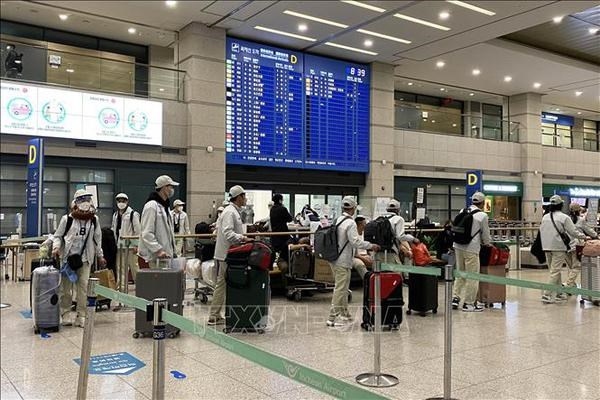Strengthened medical measures on travelers from Vietnam to affect bilateral partnership
The Republic of Korea (RoK)’s decision to impose stronger COVID-19 control measures on travelers from Vietnam is likely to affect many areas in partnership between the two countries, including labour cooperation.

On March 18, the RoK decided to list Vietnam among countries subjected for strengthened medical supervision as part of its measures to prevent the pandemic.
Accordingly, from April 1, travelers from Vietnam, vaccinated against COVID-19 or not, will have to take mandatory seven-day quarantine. Flights from Vietnam to the RoK will be allowed to carry passenger number equivalent to only 60% of their capacity.
According to Ta Thi Thanh Thuy, head of the Labour Management Board under the Vietnamese Embassy in the RoK., over the years, the number of Vietnamese guest workers in the RoK has risen, and Vietnam has become one of the three countries receiving the earliest permission to send labourers to the RoK right after the country accepts foreign labourers again.
The Vietnamese Government has officially announced full opening for international arrivals and visa exemption for citizens from 13 countries, including the RoK, she said, holding that the mandatory quarantine policy for people from Vietnam will increase cost for labourers and force Korean employers to wait for longer. This will reduce the competitiveness of Vietnamese labourers compared to those from other countries, Thuy stressed.
She highlighted that Vietnam and the RoK enjoy thriving relations. This year, as the two countries will celebrate the 30th anniversary of their diplomatic ties, visits and exchange activities will increase. Therefore, the listing of Vietnam among countries for strengthened pandemic measures will cause difficulties for Vietnam and affect the Korean investors’ activities as well as visits by members of Korean-Vietnamese families, Thuy added.
Vietnam is the third largest trade partner of the RoK and a favourite travel destination of Koreans. The measures are predicted to pose negative impacts on tourism cooperation between the two countries.

